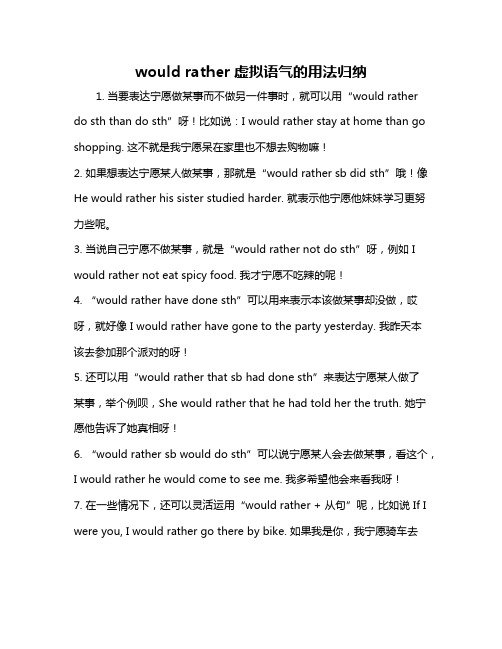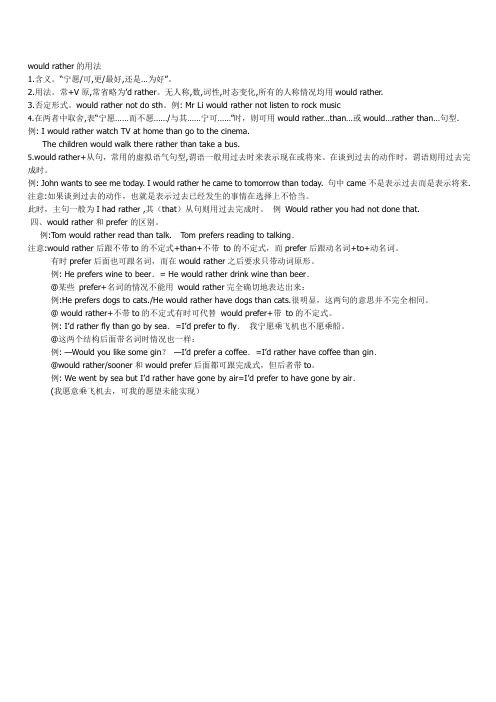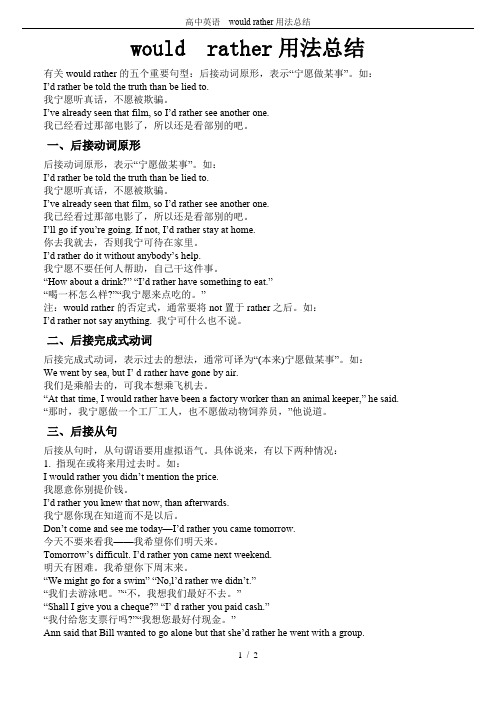would rather的用法小结
wouldrather的用法讲解

would rather的用法讲解下面是小编整理的一些关于would rather的用法,希望呢个更好地认识would rather这个词组,提高英语水平。
一、would rather意思是“宁愿、宁可、更、最好、还是为好”,后接动词原形,常省略为’d rather,表示优先选择的一种方式。
其否定形式是would rather not do sth。
would rather没有人称和数的变化,所有的人称一律用would rather。
“would rather+动词原形”是英语中常见的一个惯用句式,美国英语中多用had rather。
would (had)在此决无“过去”之意,它是一个情态助动词,且无词性、时态变化。
【例句】Mr Li would rather not listen to rock music. 李先生不愿意听摇滚音乐。
If you’d rather be alone, we’ll all leave here. 如果你宁愿独自呆着,那我们都离开这儿。
He’d rather work in the countryside. 她宁可到农村去工作。
You would rather stay at home and do some reading this evening. 今晚你最好呆在家中读点书。
二、如果在两者中进行取舍,表示“宁愿……而不愿……,与其……宁可……”的意思时,则可用would rather…than…或would…rather than…的句型。
【例句】I would rather watch TV at home than go to the cinema. 我宁可在家看电视而不愿去看电影。
The children would walk there rather than take a bus. 孩子们宁愿步行去那里而不愿乘公共汽车。
请注意:1) would rather…than…/would…rather than…也可以颠倒为:rather than…would…。
would rather虚拟语气的用法归纳

would rather虚拟语气的用法归纳1. 当要表达宁愿做某事而不做另一件事时,就可以用“would rather do sth than do sth”呀!比如说:I would rather stay at home than go shopping. 这不就是我宁愿呆在家里也不想去购物嘛!2. 如果想表达宁愿某人做某事,那就是“would rather sb did sth”哦!像He would rather his sister studied harder. 就表示他宁愿他妹妹学习更努力些呢。
3. 当说自己宁愿不做某事,就是“would rather not do sth”呀,例如 I would rather not eat spicy food. 我才宁愿不吃辣的呢!4. “would rather have done sth”可以用来表示本该做某事却没做,哎呀,就好像 I would rather have gone to the party yesterday. 我昨天本该去参加那个派对的呀!5. 还可以用“would rather that sb had done sth”来表达宁愿某人做了某事,举个例呗,She would rather that he had told her the truth. 她宁愿他告诉了她真相呀!6. “would rather sb would do sth”可以说宁愿某人会去做某事,看这个,I would rather he would come to see me. 我多希望他会来看我呀!7. 在一些情况下,还可以灵活运用“would rather + 从句”呢,比如说 If I were you, I would rather go there by bike. 如果我是你,我宁愿骑车去那儿啊!这多实用呀!我的观点结论就是:would rather 的虚拟语气用法好多呀,掌握了就能让我们的表达更丰富、更准确呢!。
would_rather的用法小结

would rather的用法1.含义。
“宁愿/可,更/最好,还是…为好”。
2.用法。
常+V原,常省略为’d rather。
无人称,数,词性,时态变化,所有的人称情况均用would rather.3.否定形式。
would rather not do sth。
例: Mr Li would rather not listen to rock music4.在两者中取舍,表“宁愿……而不愿……/与其……宁可……”时,则可用would rather…than…或would…rather than…句型. 例: I would rather watch TV at home than go to the cinema.The children would walk there rather than take a bus.5.would rather+从句,常用的虚拟语气句型,谓语一般用过去时来表示现在或将来。
在谈到过去的动作时,谓语则用过去完成时。
例: John wants to see me today. I would rather he came to tomorrow than today. 句中came不是表示过去而是表示将来. 注意:如果谈到过去的动作,也就是表示过去已经发生的事情在选择上不恰当。
此时,主句一般为I had rather ,其(that)从句则用过去完成时。
例Would rather you had not done that.四、would rather和prefer的区别。
例:Tom would rather read than talk. Tom prefers reading to talking.注意:would rather后跟不带to的不定式+than+不带to的不定式,而prefer后跟动名词+to+动名词。
有时prefer后面也可跟名词,而在would rather之后要求只带动词原形。
高中英语---would rather用法总结

would rather用法总结有关would rather的五个重要句型:后接动词原形,表示“宁愿做某事”。
如:I’d rather be told the truth than be lied to.我宁愿听真话,不愿被欺骗。
I’ve already seen that film, so I’d rather see another one.我已经看过那部电影了,所以还是看部别的吧。
一、后接动词原形后接动词原形,表示“宁愿做某事”。
如:I’d rather be told the truth than be lied to.我宁愿听真话,不愿被欺骗。
I’ve already seen that film, so I’d rather see another one.我已经看过那部电影了,所以还是看部别的吧。
I’ll go if you’re going. If not, I’d rather stay at home.你去我就去,否则我宁可待在家里。
I’d rather do it without anybody’s help.我宁愿不要任何人帮助,自己干这件事。
“How about a drink?” “I’d rather have something to eat.”“喝一杯怎么样?”“我宁愿来点吃的。
”注:would rather的否定式,通常要将not置于rather之后。
如:I’d rather not say anything. 我宁可什么也不说。
二、后接完成式动词后接完成式动词,表示过去的想法,通常可译为“(本来)宁愿做某事”。
如:We went by sea, but I’ d rather have gone by air.我们是乘船去的,可我本想乘飞机去。
“At that time, I would rather have been a factory worker than an animal keeper,” he said. “那时,我宁愿做一个工厂工人,也不愿做动物饲养员,”他说道。
wouldrather用法归纳

wouldrather用法归纳编辑整理:尊敬的读者朋友们:这里是精品文档编辑中心,本文档内容是由我和我的同事精心编辑整理后发布的,发布之前我们对文中内容进行仔细校对,但是难免会有疏漏的地方,但是任然希望(wouldrather用法归纳)的内容能够给您的工作和学习带来便利。
同时也真诚的希望收到您的建议和反馈,这将是我们进步的源泉,前进的动力。
本文可编辑可修改,如果觉得对您有帮助请收藏以便随时查阅,最后祝您生活愉快业绩进步,以下为wouldrather用法归纳的全部内容。
would rather 用法归纳“would rather+动词原形"是英语中常见的一个惯用句式。
would在此决无“过去”之意,且无词性、时态变化.该句式常用来表示选择的意愿,意谓“宁可……”、“宁愿……”。
例如 :(1) He would rather work in the countryside.她宁可到农村去工作.(2) If you would rather be alone, we'll all leave here.如果你宁愿独自呆着,那我们都离开这儿。
would rather与than连用,可构成另一个惯用句式,即:“would rather...than。
”,意谓“宁可(愿)……(而)不要(愿)……”、“与其……不如……”。
用以表达主语的意愿,强调经过选择后做其中一件事,而不愿做另一件事。
例如:(4) I would rather watch TV at home than go to the cinema.我宁可在家看电视而不愿去看电影。
(5)The children would rather walk there than take a bus.孩子们宁愿步行去那里而不乘公共汽车。
在使用“would rather..。
than.。
"句型时,应注意以下几点:1. than后边也应接动词原形(见句(4)和(5)),但如该句型前后连接的两个动词相同,则 than之后的那个动词可省去。
英语词组wouldrather用法最全

英语词组wouldrather用法最全词组would rather的用法1. 表示“宁愿做某事”:(非虚拟语气)记住两个常用的重要的词组:would rather do sthwould rather do sth than do sth= prefer to do rather than do sth例句1:I’d rather stay single to study all my life.我宁愿一辈子不嫁人,也要学医。
例句2:I would rather live an independent life than rely on my parents.= I prefer to live an independent life rather than rely on my parents.我宁愿独立生活也不想依靠我的父母。
2. would rather 表示虚拟语气:would rather 后接从句时,若表示与现在或将来情况相反,从句用一般过去时;若表示与过去情况相反,从句用过去完成时。
例句1:I would rather I worked in a smaller company now.我宁愿现在在一个小公司就职。
(对现在的虚拟)例句2:I’d rather I had gone to the theatre than stayed at home last night.= I’d rather have gone to the theatre than stayed at home last night.我宁愿昨天晚上去看电影而不是呆在家里。
(对过去的虚拟)例句3:I’m not free tomorrow. I’d rather you came next weekend.我明天没空。
我宁愿你下个周末来。
(对将来的虚拟)小检测一.词的适当形式填空:1. He would rather _________(keep) time for his hobbies.2. She would rather ___________(move) to another city than _________(stay) in the present city.3. I would rather she __________(ask) me before borrowing my car.4. I’d rather you __________(pick) her up at the airport tomorrow morning.5. I’d rather you ___________(finish) your homework now. Then we can go out to play basketball.答案:1. keep 2. move, stay 3.had asked 4. picked 5. finished二.同义句转换:1. I would rather I had hired him as my secretary last year.→I would rather ________ _________ him as my secretary last year.2. I would rather go outside than stay at home doing nothing.I __________ __________ go outside rather than stay at home doing nothing.答案:1. have hired 2. prefer to。
would rather的用法小结

would rather的用法小结XXX的用法(在美国英语中多用had rather)概述:XXX的含义是“宁愿/可,更/最好,还是……为好”。
它常与V原搭配,也可以省略为’d rather,表示优先选择的一种方式。
此外,would rather在所有人称情况下都不会发生变化,也不受时态、数、词性等的限制。
当然,它也可以用于否定形式,即would rather not do sth。
例如:如果你宁愿独自呆着,那我们都离开这儿。
If you’d rather be alone。
we’ll all leave here.她宁可到农村去工作。
He’d rather work in the countryside.扩展:当需要在两者之间做出选择,表达“宁愿……而不愿……/与其……宁可……”时,可以使用would rather…than…或would…rather than…的句型。
例如:我宁愿在家看电视,也不愿去电影院。
I would rather watch TV at home than go to the cinema.孩子们宁愿走路去那里,也不愿坐公交车。
The children would walk there rather than take a bus.也可以将句型颠倒,变为rather than…would…。
例如:他宁可放弃,也不愿在如此恶劣的条件下工作。
Rather than work in such bad n。
he would give up.需要注意的是,在使用不带to的动词不定式时,than后的动词可以省略。
例如:我宁愿吃面条,也不愿吃米饭。
I would rather have noodles than rice.另外,在使用平行结构时,需要在than的前后使用两个同类的词或词组,如两个名词、两个不定式、两个介短语等。
例如:我宁愿骑自行车上班,也不愿坐公交车。
I would rather go to work by bike than by bus.我宁愿和他的妈妈聊天,也不愿和他的爸爸聊天。
初中英语语法wouldrather如何使用

初中英语语法wouldrather如何使用初中英语语法:英语语法大全之would rather用法一: would rather表示"宁愿"would rather dowould rather not dowould rather… than… 宁愿……而不愿。
还有would sooner, had rather, had sooner都表示"宁愿"、"宁可"的.意思。
If I have a choice, I had sooner not continue my studies at this school.I would rather stay here than go home. = I would stay here rather than go home.用法二:would rather后句子用虚拟语气would rather后接句子时,句子谓语习惯上要用虚拟语气,具体用法为:1.一般过去时表示现在或将来的愿望I’d rather y ou went tomorrow (now). 我宁愿你明天(现在)去。
I’d rather you came next Saturday. 我宁愿你下星期六来。
I’d rather you were happy. 我愿你快乐。
I’d rather she sat next to me. 我宁愿她挨着我坐。
I’d rather Jack left on an earlier train. 我宁愿杰克乘前一班火车走。
You always go without me and l’d rather you didn’t. 你总是不带我去,我可不愿意你这样。
“Shall I open the window? ” “I’d rather you didn’t. ”“我要不要把窗子打开? ” “我看不要打开好。
- 1、下载文档前请自行甄别文档内容的完整性,平台不提供额外的编辑、内容补充、找答案等附加服务。
- 2、"仅部分预览"的文档,不可在线预览部分如存在完整性等问题,可反馈申请退款(可完整预览的文档不适用该条件!)。
- 3、如文档侵犯您的权益,请联系客服反馈,我们会尽快为您处理(人工客服工作时间:9:00-18:30)。
would rather的用法(美国英语中多用had rather )
一、概述。
1.含义。
“宁愿/可,更/最好,还是…为好”。
2.用法。
常+V原,常省略为’d rather,表优先选择的一种方式。
无人称,数,词性,时态变化,所有的人称情况均用would rather.
3.否定形式。
would rather not do sth。
例: Mr Li would rather not listen to rock music
4.would /had在此决无“过去”之意,它是一个情态助动词。
If yo u’d rather be alone, we’ll all leave here. 如果你宁愿独自呆着,那我们都离开这儿。
He’d rather work in the countryside. 她宁可到农村去工作。
二、扩展。
1.在两者中取舍,表“宁愿……而不愿……/与其……宁可……”时,则可用would rather…than…或would…rather than…句型. 例: I would rather watch TV at home than go to the cinema.
The children would walk there rather than take a bus.
2.也可以颠倒为:rather than…would…例:Rather than work in such bad condition, he would give up
3.Would(rather)和than后都接不带to的动词不定式,若选同一动词,那么than 后的动词可以省略。
例: I would rather have noodles than rice.
4.要注意“平行结构”,即在than 的前后要用两个同类的词或词组,如两个n、两个不定式、两个介短等。
例: I would rather go to work by bike than by bus.
@I would rather talk with his mother than with his father.
5.在疑问句式中,短语中的would要放在主语之前。
例: Would you rather stay here or go home?
@Which would you rather have, apples or bananas?
三、would rather+从句,常用的虚拟语气句型,谓语一般用过去时来表示现在或将来。
其意为“宁愿……,还是…… 好些”“一个人宁愿另一个人做某事”。
引导从句的that常省略。
在谈到过去的动作时,谓语则用过去完成时。
例: John wants to see me today. I would rather he came to tomorrow than today. 句中came不是表示过去而是表示将来. 注意:如果谈到过去的动作,也就是表示过去已经发生的事情在选择上不恰当。
此时,主句一般为I had rather ,其(that)从句则用过去完成时。
例Would rather you had not done that.
@如果只涉及主语本人而不涉及另一个人,则would rather之后不接that从句而接have done结构。
例: I would rather have gone to the theatre than stayed home night.
四、would rather/sooner和prefer/would prefer的区别。
would rather和would sooner之间一般没有区别,但经常接触到的是would rather。
例:Tom would rather/sooner read than talk./ Tom prefers reading to talking.
注意:would rather后跟不带to的不定式+than+不带to的不定式,而prefer后跟动名词+to+动名词。
有时prefer后面也可跟名词,而在would rather之后要求只带动词原形。
例: He prefers wine to beer.= He would rather drink wine than beer.
@某些prefer+名词的情况不能用would rather完全确切地表达出来:
例:He prefers dogs to cats./He would rather have dogs than cats.很明显,这两句的意思并不完全相同。
@ would rather+不带to的不定式有时可代替would prefer+带to的不定式。
例: I’d rather fly than go by sea.=I’d prefer to fly.我宁愿乘飞机也不愿乘船。
@这两个结构后面带名词时情况也一样:
例: —Would you like some gin?—I’d prefer a coffee.=I’d rather have coffee than gin.
@would rather/sooner和would prefer后面都可跟完成式,但后者带to。
例: We went by sea but I’d rather have gone by air=I’d prefer to have gone by air.
(我愿意乘飞机去,可我的愿望未能实现)。
